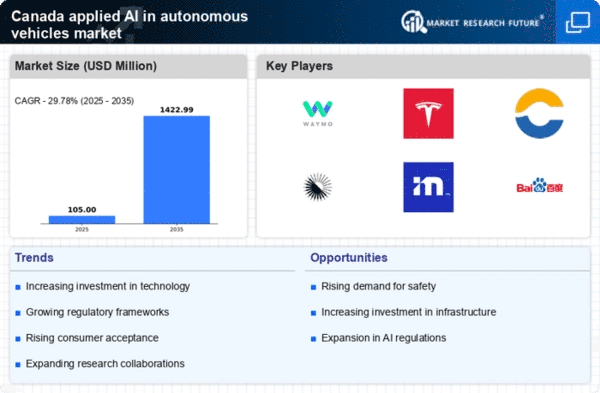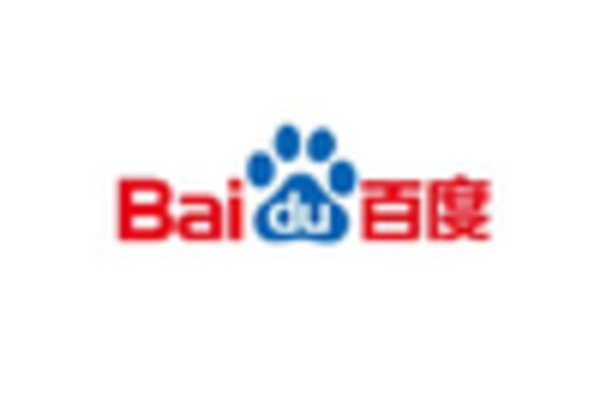Government Support and Funding
Government initiatives aimed at promoting the development of autonomous vehicle technologies significantly influence the applied ai-in-autonomous-vehicles market. In Canada, various federal and provincial programs provide financial support and incentives for companies engaged in autonomous vehicle research and development. For instance, the Canadian government has committed to investing $300 million in clean technology and innovation, which includes funding for AI applications in transportation. This support not only accelerates technological advancements but also encourages collaboration between public and private sectors, ultimately driving the growth of the applied ai-in-autonomous-vehicles market.
Technological Advancements in AI
The rapid evolution of artificial intelligence technologies is a primary driver for the applied ai-in-autonomous-vehicles market. Innovations in machine learning, computer vision, and sensor technologies enhance vehicle capabilities, enabling safer and more efficient navigation. In Canada, investments in AI research have surged, with the government allocating over $1 billion to AI initiatives in recent years. This funding supports the development of advanced algorithms that improve decision-making processes in autonomous vehicles. As AI technologies continue to mature, they are likely to play a pivotal role in the integration of autonomous systems into everyday transportation, thereby fostering growth in the applied ai-in-autonomous-vehicles market.
Consumer Demand for Safety Features
Increasing consumer demand for enhanced safety features in vehicles is a crucial driver for the applied ai-in-autonomous-vehicles market. Canadian consumers are becoming more aware of the benefits of autonomous technologies, particularly in terms of accident reduction and improved road safety. According to recent surveys, approximately 70% of Canadians express interest in vehicles equipped with advanced driver-assistance systems (ADAS). This growing preference for safety-oriented features is prompting manufacturers to invest in AI technologies that enhance vehicle safety, thereby propelling the applied ai-in-autonomous-vehicles market forward.
Urbanization and Traffic Congestion
The ongoing trend of urbanization in Canada is contributing to the growth of the applied ai-in-autonomous-vehicles market. As cities expand and populations increase, traffic congestion becomes a pressing issue, leading to a demand for innovative transportation solutions. Autonomous vehicles, powered by AI, offer the potential to optimize traffic flow and reduce congestion through smart routing and real-time data analysis. In major Canadian cities, the implementation of autonomous vehicle pilot programs is underway, indicating a shift towards integrating these technologies into urban transportation systems. This trend is likely to drive further investment in the applied ai-in-autonomous-vehicles market.
Environmental Sustainability Initiatives
The push for environmental sustainability is increasingly influencing the applied ai-in-autonomous-vehicles market. In Canada, there is a strong emphasis on reducing greenhouse gas emissions and promoting eco-friendly transportation solutions. The government has set ambitious targets to reduce emissions by 40-45% below 2005 levels by 2030. This regulatory framework encourages the development of electric and autonomous vehicles, which are seen as key components in achieving these sustainability goals. As a result, companies in the applied ai-in-autonomous-vehicles market are likely to focus on integrating AI technologies that enhance energy efficiency and reduce the environmental impact of transportation.
















